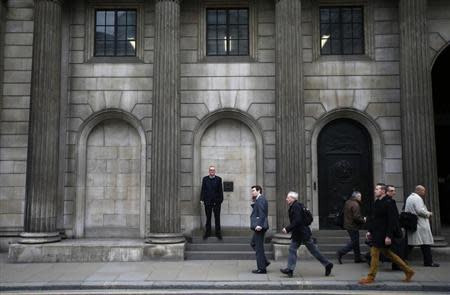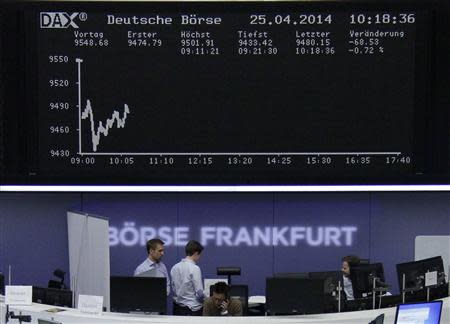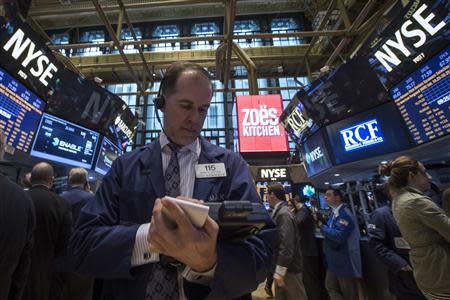Euro recovers as inflation eases pressure on ECB
By Marc Jones LONDON (Reuters) - The euro recovered and the currency bloc's government bonds retreated on Wednesday after euro zone inflation stayed just about strong enough to suggest the European Central Bank will take no action when it meets next week. Euro zone inflation nudged up to 0.7 percent in April preliminary figures showed, and though it remained well below the ECB's target rate of just below 2 percent the figure is likely to come as a relief to the bank after a weak reading out of Germany on Tuesday. With investors also awaiting the outcome of a U.S. Federal Reserve meeting and further developments in Ukraine, a cautious market mood kept the euro under pressure in the run-up to the data. Its release lifted the shared currency to a session high of $1.3824 as market chatter of a rate cut or alternative easing measures faded. ECB head Mario Draghi said last week that if the inflation outlook were to deteriorate, the ECB could respond with a "broad-based asset purchase program", probably quantitative easing - effectively printing money to buy assets. On Monday, however, he told lawmakers from Germany's ruling coalition that while low inflation would persist in the euro zone, he did not expect deflation, according to a source who attended the meeting. "The two important data for the ECB, inflation today and M3 (money supply) yesterday came in on the weak side which means the ECB is really under pressure, the problem is they have been under pressure for a while," said Philippe Gudin de Vallerin head of euro research for Barclays. "They are definitely not complying with their mandate... The key is the euro, they really need to weaken the euro but it is not easy." Euro zone government bonds across the spectrum from Germany and France to Greece and Portugal also switched direction, with prices reversing as the prospect of steady ECB rates reheated concerns about their current value for money. European stocks took a breather, having jumped to a near four-week high on Tuesday thanks to combination of strong earnings, merger moves and relief at the mild tone of sanctions imposed on Russia by the West. <.EU> Shares in French conglomerate Alstom stood out. They jumped 8 percent after the firm said it would review an offer from General Electric for its energy business and left the door open for a rival bid from German giant Siemens . FED MEETING Futures prices pointed to minor profit taking in early Wall Street trading after gains on Tuesday and a strong last two weeks. <.N> Asian shares had struggled while the yen strengthened after upbeat Bank of Japan economic projections suggested no additional stimulus was on the near-term horizon. Japan's Nikkei stock average <.N225> edged up on Wednesday but logged a drop of 3.5 percent in April, while China's yuan completed its fourth straight month of losses as it ended April at an 18-month low. Later on Wednesday, Fed officials are expected to decide unanimously at the conclusion of their two-day meeting to continue tapering the central bank's massive bond-buying stimulus. Investors will focus on what their statement implies about the monetary policy outlook. "Fed policy is basically on cruise control while the (policy) Committee waits to see how the economy rebounds from the cold weather, how the labor market is progressing, and whether inflation returns to more normal levels," Marshall Gittler, head of FX strategy at IronFX Global, said in a note to clients. U.S. jobs data - invariably a focus for investors - is due on Friday. MIXED SIGNALS Meanwhile, markets digested some mixed signals from Europe. In its latest quarterly bank lending survey, the ECB painted a more upbeat picture that it had in Tuesday's disappointing euro zone credit reading. Figures from Madrid earlier showed Spain's economy saw its strongest quarterly growth in six years in the first quarter of the year although retail sales both there and in Germany sagged last month. Market participants continued to track developments in Ukraine, where hundreds of pro-Moscow separatists stormed government buildings in a provincial capitals on Tuesday and fired on police holed up in a regional headquarters. The dollar recovered most of the day's losses on the yen to 102.54 yen, have struck a low of 102.28 yen soon after the BOJ revealed its upbeat forecasts. In commodities trading, spot gold slipped 0.2 percent to $1,292.80 an ounce. U.S. crude dropped 1 percent to $100.27 per barrel, on expectations that U.S. inventories would hit the highest level on record. Brent fell to $108.41 (Reporting by Marc Jones; Editing by John Stonestreet)




